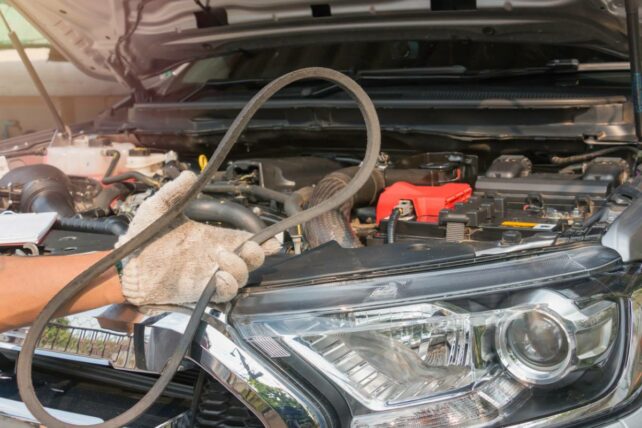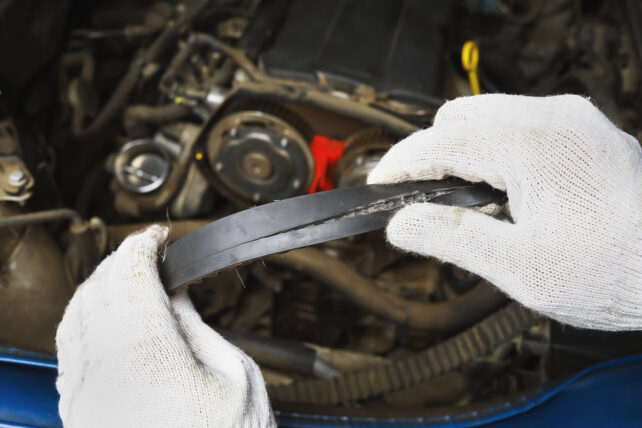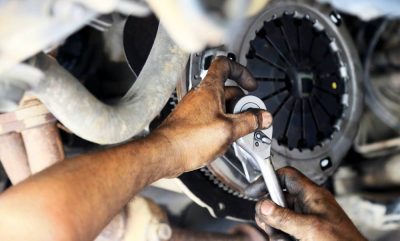- Oneflare /
- Cost Guides /
- Car Timing Belt

How much does it cost to replace a timing belt?
$500 - $1,000
What's on this page
- Cost to replace a timing belt
- What is a timing belt?
- Replacement cost based on car model
- Replacement cost based on location
- Factors impacting car timing belt replacement costs
- When to replace your timing belt
- How to estimate timing belt replacement costs
- How to save money when hiring a mechanic
Read Related Car Timing Belt Articles
How much does it cost to replace a timing belt?
A car is a sum of its parts. Whether as big as the tyres or as small as an engine light, owners should get their vehicles checked regularly. One of the parts that could get run down quickly is the timing belt. If your timing belt is worn out, it can cause damage to different engine components and your car.
Timing belt replacement costs can vary per car, but the average range goes between $500 to $1,000, depending on your car model. Beyond the part you’re replacing, the tedious labour goes into the replacement and ramps up the cost.
What is a timing belt?
The timing belt, which typically sits under the timing cover, attunes the camshaft and the crankshaft to rotate at the same time for efficient engine operation. It’s a strong rubber band, usually with nylon-reinforced cords or other reinforcement material, to make sure it doesn’t break easily. A car with a damaged timing belt can cause irreparable engine damage, so it’s best to give broken belts prompt attention.
What’s the difference between a car timing belt and a timing chain?
A timing belt and a timing chain serve the same function. While a timing belt is made of reinforced rubber, a timing chain is a metal chain that also connects the camshaft and the crankshaft.
A timing chain is an internal engine component that gets lubricated by the engine’s oil in order for everything to work in unison. When an engine fires over, the timing chain will also be running. It connects the camshaft to the crankshaft. Metal chain links are used in the chain to ride over the toothed sprockets attached to the end of the camshaft and crankshaft to rotate at the same time.
It’s important to note that not all vehicles use a rubber timing belt. Most of today’s vehicles use timing chains, and most vehicles manufactured before 1995 use a timing belt. If you’re unsure if you have a timing chain or timing belt on your vehicle’s engine, read your owner’s manual. Additionally, it should also tell you how many kilometres or months before your vehicle’s engine will need a timing chain replacement or timing belt change.
How much does it cost to replace a timing belt based on the vehicle?
The car model is a big determining factor for a timing belt replacement cost. The timing belt cost differs between the size of the car and engine type, and the latter also plays a role in the wide range of prices in vehicles of the same model. Labour costs can also vary between shops, requiring a mechanic to replace your timing belt.
| Car model | Average reported cost |
| 2007 Holden Captiva | $415 – $1,200 |
| 2008 Volkswagen Crafter | $900 – $1,110 |
| 2005 Mitsubishi 380 | $800 – $1,500 |
| 2002 Mitsubishi Magna | $410 – $1,320 |
| 2008 Ford Ranger | $250+ |
| 2010 Holden Barina | $250 – $1,000 |
How much does timing belt replacement cost in Australia based on state or city?
Labour costs can vary between states in Australia and will affect the price of your timing belt replacement. Replacing a timing belt takes a skilled auto mechanic, so a broken belt should only be serviced by a skilled and qualified professional.
| State | Average cost |
| Western Australia | $350–$500 |
| Victoria | $800–$1,000 |
| Queensland | $600–$900 |
| City | Average cost |
| Sydney | $800–$1,000 |
| Brisbane | $500–$1,200 |
| Queensland | $630–$900 |
Factors affecting the costs of timing belt replacement in Australia
Vehicle model
As mentioned before, the vehicle model is a significant determining factor for the cost of timing belts. With rates somewhere between $300 and $1,500, getting the right timing belt for your vehicle can be quite pricey.
Location
Depending on your area, mechanics charge different prices for the service. For example, mechanics in a small town can charge a lower price for the repair. However, maintenance specialists in big cities can charge up to a thousand dollars for a belt replacement as it is a specialised repair.
Type of engine
Depending on your car’s engine, there are various standard sizes for a timing belt. It isn’t essential to know all the different types, as you only need to know your car’s type, but remember that bigger engines mean bigger and more expensive timing belts.
Task complexity
Sometimes, your broken or faulty timing belt isn’t the only part that needs fixing. Other components like your belt tensioner and your water pump might also need changing, which can significantly affect how much you need to replace the timing belt along with the engine valves and other parts.
Labour
A specialised repair like a timing belt replacement needs an experienced and knowledgeable mechanic, and their labour rates tend to cost more. Expect to pay around $400 to $500 for labour costs.
Other auto repair services that may be required
If your timing belt or chain breaks, you can expect that other components like the water pump, AC unit, valves, pistons or the engine may need to be replaced in addition to the new timing belt or timing chain.
Since labour rates are rather expensive when it comes to changing a timing belt, it’s also a good idea to replace your water pump, pulleys, tensioners, and front seals rather than to pay additional labour fees down the road because those components have just as many kilometres as your timing belt does.
When to change a timing belt
There are a variety of elements that can affect the life of a timing belt, such as exposure to airborne contaminants, oil leaks, coolant seepage, humidity, extreme temperatures, frequent engine starts or stops, and kilometres driven.
It’s not wise to wait until your timing belt breaks to replace it, as a bad timing belt can cause terrible damage to your vehicle. It’s best to check your owner’s manual, but the rule of thumb is every 7 to 10 years or 40,000 to 150,000 kilometres driven, whichever comes first.
Signs that your timing belt needs replacement
It’s important to recognise the symptoms to have it replaced before it completely fails. The best time to consider a timing belt service is when you notice these warning signs from your vehicle:
- Your vehicle is idling rough and engine shakes
- Your vehicle is making a rattling noise with abnormal squeaking
- You can smell burnt rubber coming from the engine compartment
- You see leaking oil seals
- Your vehicle will not start, a sure sign of complete timing belt or chain failure
Tips on how to estimate timing belt replacement costs
Tip #1: Always get at least two or three quotes from local certified auto mechanics. Be prepared as the price can be shocking and expensive.
Tip #2: You should know what the regular service includes. For example, is the shop’s price just for replacing the timing belt, or does it include the water pump, tensioners, and seals?
Tip #3: You can expect anywhere between four to six hours for labour to replace a timing belt on most vehicles, and to be on the safe side, you should set yourself a budget of around $1,000 for most timing belt repairs.
Tips on how to save money when hiring a mechanic
Tip #1: When it comes to regular services, get a written quote of the work to be done, including parts and labour. You can save money by shopping around, and don’t go with the first quote because it’s close to home.
Tip #2: Keep in mind that other parts, like the water pump, front seals, tensioners, and pulleys, may need to be replaced as well. You can save money by purchasing the complete timing belt kit, which includes these extra parts.
Tip #3: It’s important to understand that most timing belt repairs can take several hours, and you should expect to be without your car for at least one day or more, depending on your auto mechanic’s schedule.
Only professionals can replace timing belts
Only those professionally trained to tinker with your engine can replace your timing belt. It’s tricky to handle the replacement on your own, and even if you could DIY, the replacement parts can be difficult to get your hands on.
Timing belt replacement, engine rebuilds and other car problems can only be handled by auto mechanics with the right experience, so look for one in your area and consult a car service specialist to ensure your vehicle runs at maximum efficiency!
* The cost data is based on Oneflare and third-party sources
FAQs on timing belt replacement
How long does it take to replace a timing belt?
How long does a new timing belt last?
Is it worth fixing a timing belt on a car?
Real Oneflare Customer Quotes
Daan's Timing Belt Job
Problem
Timing belt replacement
Other issues
Oil leak from timing seals
Type of service
Mobile mechanic
$630inc. gst
Ali's Timing Belt Job
Problem
Timing belt replacement
Other services
Water pump changed
Cost
Includes both timing belt and water pump service
$835inc. gst
Quoted by Mobile Auto Care
David's Timing Belt Job
Problem
Timing belt
Type of service
Timing belt replacement
Car make and model
Holden UTE
$1500inc. gst
Quoted by Automobile Magic Qld





